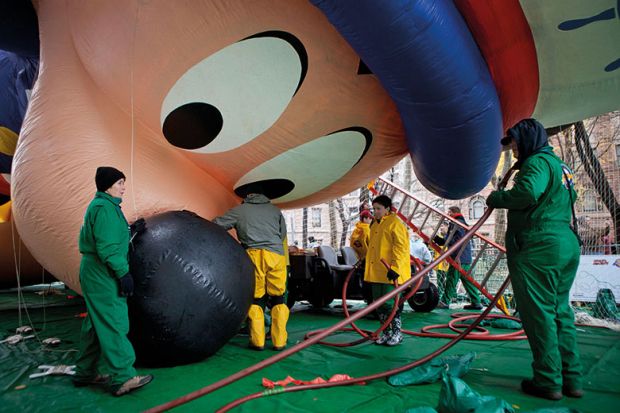It is a deeply entrenched British tradition to build ‘em up, then knock ‘em down.
At the point at which someone reaches a peak of popularity, a swift downfall is demanded (and if you doubt that this is still the case, just look at the Duke and Duchess of Sussex, a modern classic of the genre).
Is it possible that this choleric attitude to the success of a high-profile individual, or couple, could be applied to higher education?
Over successive decades, under both Labour and Conservative governments, higher education has grown and grown, recently passing the 50 per cent participation target that was set by Tony Blair.
This, depending on one’s point of view, is either a tale of social and economic progress, or further evidence that universities have turned into mediocre production lines that will take anyone who pays the fees.
If you are a proponent of the latter view, you might add that they are not only sub-standard, but also “left-wing madrassas” (copyright Toby Young, the man narrowly prevented from joining the board of the Office for Students last year).
Academic disciplines have been a key battleground for this difference of opinion.
If it is rare that you hear arguments for STEM courses to be disbanded or reduced in number, the opposite is true of media studies, the standard target for those “Mickey Mouse” jibes.
In our cover story this week, we ask scholars in the field of media studies to assess the state of their discipline and its relevance in today’s world (in which rigorous analysis of how communication, digital literacy and consumption of media truth and untruth is more topical than ever).
There’s not much that is new in this tension, but there is perhaps a new urgency – or moment to seize – with the passing of the high-profile 50 per cent threshold, and the double risk of Brexit and the proposals made by the Augar review.
While the danger of a significant cut in tuition fees and funding appears to have receded in the short-term, it’s inevitable that whenever the next general election comes higher education will once again be a policy battleground.
One area of focus is likely to be the supposed imbalance between funding for further education and higher education, a story that is often spun as an oversupply of media studies graduates versus a shortage of plumbers.
It may come as a surprise that Boris Johnson has in the past helped to debunk this notion.
He wrote the following in a column in The Telegraph newspaper in 2007: “Why, [we] ask rhetorically, are we paying for students to waste their time on these Mickey Mouse courses, when it is perfectly obvious what they should be doing. Trades! Skills! Craft! This country doesn’t need more bleeding degrees in media studies and whispering into horses’ ears! What we need is people who can fix my septic tank! We need more plumbers… And yet I have to say that this view of higher education – pandemic in Middle Britain – is hypocritical, patronising and wrong.”
If this is reassuring up to a point, then it is worth chucking in a couple of caveats: one, that the now Prime Minister’s trenchant support was based almost entirely on the graduate salary premium; and two, that he identified “the real scandal” as being that tuition fees paid by undergraduates did not vary by course and institution. It is also worth acknowledging that he has not been a paragon of consistency.
A further point that should not be forgotten is that universities do deliver vocational and technical education, so this is not the upstairs/downstairs divide it is often made out to be.
In any case, robbing Peter to pay Paul is rarely, if ever, the answer. As Lord Kerslake, former head of the UK civil service, put it pithily at the Conservative Party conference last week: “Just because we've messed up FE, that isn’t a reason to mess up HE”.
Register to continue
Why register?
- Registration is free and only takes a moment
- Once registered, you can read 3 articles a month
- Sign up for our newsletter
Subscribe
Or subscribe for unlimited access to:
- Unlimited access to news, views, insights & reviews
- Digital editions
- Digital access to THE’s university and college rankings analysis
Already registered or a current subscriber? Login




